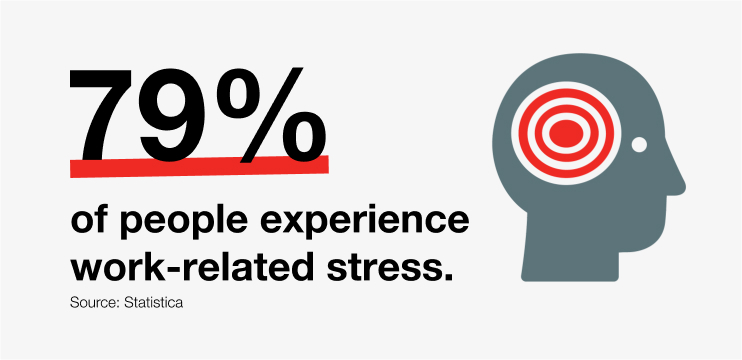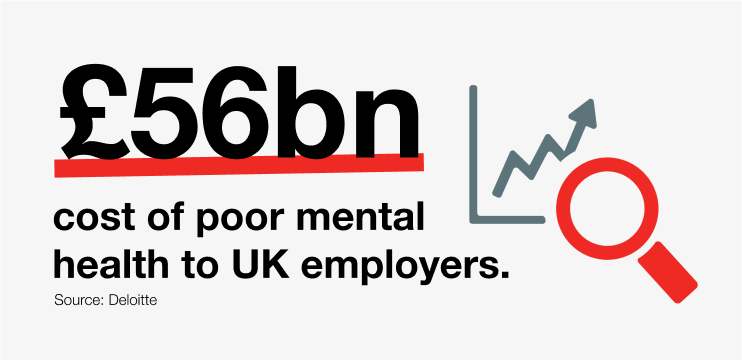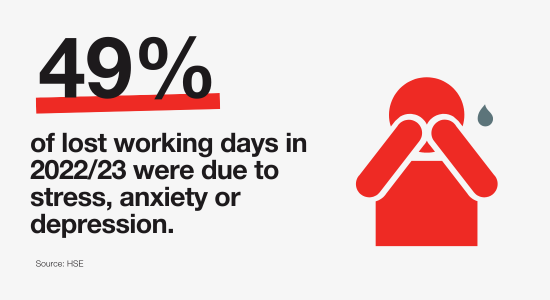Contents
- Why is mental health support in the workplace important?
- How can employers support mental health in the workplace?
- Recognising signs of poor mental health in the workplace
- Workplace stress
- How to provide mental health support in the workplace
- The role of communication in mental health support in the workplace
- Mental health training and the workplace
Why is mental health support in the workplace important?
Research has revealed that 12.7% of all UK sickness absence days could be attributed to mental health challenges.
Though improvements have been made to assist team members, there is work to be done to support employees’ mental health in the workplace, with a staggering 17.1 million days lost to work-related stress, anxiety or depression in 2022/23.
Working days lost due to illness can contribute to further challenges down the line, such as higher staff turnover, disengagement, lower quality of work, and potential difficulty with future recruitment.
This guide outline key steps you can take to promote wellbeing and resilience, rather than dealing with mental health problems within your team after they have occurred.
Identify suitable mental health training for your team
There is no such thing as a universal approach to learning. Identify appropriate training to fulfil the needs of your team.
Most people experience work-related stress
Too much can lead to illness and lost productivity. Find out the top 10 causes of stress at work – and learn how to address them.
Supporting your team’s mental health can improve your bottom line
Every £1 invested in mental health support sees a return of £5 in reduced absences and presenteeism. Learn how to create a mental health plan for a healthy and productive workplace.
Are you losing working days because of stress and mental health problems?
When you help employees to manage stress and improve resilience, absences drop. Find out how to promote wellbeing at work by downloading our free checklist.
How can employers support mental health in the workplace?
As an employer, you have a legal responsibility to manage the health and safety of your employees - and this includes tackling work-related stress. 2024 Health and Safety Executive (HSE) guidance introduces the inclusion of mental health within first aid needs assessments to identify additional training requirements. It’s crucial to treat mental health in the workplace as you would first aid requirements within your organisation, and plan the training you require accordingly.
It’s also considered best practice to:
- Communicate with staff.
- Enforce a discrimination policy.
- Provide free access to support and mental health services.
- Promote inclusivity.
- Set realistic expectations.
- Offer wellness programs.
- Invest in company culture.
While staff sick days can be inconvenient, a patient approach is key when handling cases of mental health in the workplace. This will ensure your employees receive the support they need.
Empower your team with compliant mental health support
Gain a thorough understanding of the obligations you have towards your team as part of your role.
Recognising signs of poor mental health in the workplace
It is important to recognise signs and symptoms of poor mental health in the workplace, to ensure adequate support can be provided for your staff, whenever necessary.
Unexplained absences
Unexplained absence can sometimes indicate that a team member needs a little more patience and support. In such circumstances, it is essential to approach the matter delicately.
Communication is key in managing the absence and gaining a clear understanding of how the individual is feeling. This will ensure you can put appropriate measures in place to help your employee return to work when they are ready.
A period of extended absence may be required, in which case, a phased return can be discussed.
Learn how to discuss mental health with your team
Get your copy of ‘Talking to Employees About Their Mental Health: Your Guide to Starting the Conversation’.
Poor time management
Poor time management is another sign that a team member is struggling.
With 822,000 UK-based workers struggling with anxiety, work-related stress, or depression per year, it’s important to put measures in place to help your team members plan their time effectively.
If a circumstance materialises when an employee is struggling with time management, it is important to identify the root cause of the problem.
For example, in some instances, it may be the case that unrealistic deadlines are contributing to stress. In this case, work alongside appropriate members of the team to revise timeframes and help them reduce their stress.
.jpg?width=1202&height=800&name=39502scr_bd1ca0213278d62%20(1).jpg)
Increased irritability
It is a natural human instinct to be a little irritable at times. However, excessive irritability can lead to conditions such as depression, anxiety, panic, and anger management issues. Therefore, if a member of your team is exhibiting persistent signs of stress and a lack of patience, try to understand the source of their irritation.
Reasons a member of your team may exhibit such behaviour, include:
- financial worries
- burnout
- problems at home or in their relationships
- loneliness
- work problems.
There are coping mechanisms that can be used to help team members manage irritability. For example, encourage your employees to share how they are feeling, allow them time to themselves, or if the problem is work-based, collaborate with them to set small, manageable goals to improve their morale.
Workplace stress
The overwhelming nature of workplace stress should not be underestimated.
Stress is one of the most common causes of work-based mental health challenges. Research indicates that 12.7% of all sickness absence days in the UK can be attributed to mental health conditions, with stress among them.
Whilst it is important to recognise signs of stress within your team, it is important not to lose sight of when you are stressed, because working whilst under significant stress could have a detrimental effect on your decision-making, leadership, communication, and motivation, all of which are fundamental skills in effectively managing a team.
Remember, there are stress management methods you and your team can use to manage stress so it is at a level you can cope with.
How does workplace stress affect staff?
Workplace stress affects people in several different ways.
Physically:
1. High blood pressure
2. Headaches
3. Lack of sleep
Emotionally:
1. Anxiety
2. Depression
3. Panic attacks
Intellectually:
1. Low concentration
2. Poor motivation
3. Memory loss
4. Impaired decision making
Behaviourally:
- Substance abuse
- Lateness
- Reluctance to socialise
- Improper behaviour
Taking this into consideration, it's important to understand the individual circumstances of why an employer is feeling stressed, so you can tailor your approach and give them the most suitable support to manage their stress points.

What causes workplace stress?
There are a variety of reasons for workplace stress, but common causes include:
- excessive workload
- lack of control over work
- organisational change
These causes can be addressed before an overwhelming issue manifests. For instance, excessive workload and lack of control over work go hand-in-hand. You can reduce the likelihood of workplace stress by delegating assignments elsewhere to alleviate your employee’s workload, or if possible, amend deadlines.
Similarly, if organisational changes are impending, hold a meeting with your team and outline exactly what the revised structure will look like, and where the team member will fit into the new regime.
There are other causes of stress directly related to the nature of work being undertaken by the employee. For example, call handlers often face situations when they are communicating with distressed callers.
Enrol your team in Dealing with Distressed Callers online training
Help them learn communication skills that will protect themselves and others.

Why is it important to reduce workplace stress?
Failing to support your staff can have serious repercussions for your business, including:
- high levels of absenteeism
- staff turnover
- poor timekeeping
- low morale
- poor performance
- lack of motivation.
Taking these points into account, it’s important to familiarise yourself with methods for managing stress in the workplace so that you can support your team and help them manage their stress in the best way possible.
One of the most common effects of stress is anxiety.
Learn more about anxiety at work and how to help your team
Watch the Anxiety at Work webinar featuring expert tips from Dr Cathy Troup, Senior Psychosocial Practitioner at the British Red Cross.
How can resilience help stress management?
Resilience relates to a person’s ability to adapt to change and acclimatise to challenging situations.
For example, if you suffer a bereavement or have to relocate to an unfamiliar place, having a resilient mindset will help you overcome fear and anxiety.
We are all prone to potentially experiencing work-based mental health challenges. Research has revealed that 1 in 6.8 people (14.7%) in the UK experience mental health problems in the workplace.
Resilience and conditions such as anxiety are linked. Therefore, introduce resilience-building activities and equip your team with the skills they need to protect their wellbeing.
When your team is more resilient, this will help them manage, or hopefully overcome, stress. It is a skill that helps people envisage which coping mechanisms they need to use to overcome an obstacle, should it arise.

Tips for helping employees become more resilient
Having a resilient workforce can go a long way towards reducing and managing mental health challenges in the workplace.
Here are some tips you can apply to help your team become more resilient:
- Build strong connections - Create an ‘open door’ policy, in which employees are aware that guidance and support are available.
- Set high, yet attainable goals - Introduce goals and challenges for your team members. Achievements, small and large, can instil a sense of accomplishment and purpose, improving morale within your team.
- Foster a learning environment - In the workplace, mistakes happen all the time. Make sure employees understand this to be the case. Encourage people to learn from their mistakes; being overly critical will not have a positive outcome.
- Encourage communication - Lack of communication is a surefire route to long-term problems. So, encourage your team to bring any issues to your attention, and put action plans in place to support them. While it is somewhat of a cliché, a problem shared is a problem solved.
How to provide mental health support in the workplace
As an employer, mental health support needs to be an organisational priority.
However, this isn’t a one-way street. Creating a positive mental health culture is a joint effort between you and your employees.
Create a mental health policy
Unfortunately, mental health stigma remains within some businesses. This can lead to staff feeling reluctant to share their problems with their employer.
Creating a mental health policy is an integral part of mental health management in the workplace, providing employees and management with a framework to foster a culture of fair conduct and treatment.
Introducing these measures will convey the right messages to your team, offering them the confidence and comfort they need to share any potential problems they are facing.
Create a stress-at-work policy
A stress-at-work policy should also accompany a mental health policy to further promote wellbeing amongst your team.
This should indicate the measures you and your staff can take to support people experiencing stress-related problems and to prevent further work-related stress and related mental health problems.
Generate awareness
It could well be the case that your team members simply don’t have the important knowledge required to recognise signs of poor mental health in the workplace.
If employees lack awareness about key issues, this makes it even harder to improve the overall dynamic surrounding mental health in your organisation.
Therefore, dedicate time to educating your staff about the intricacies of mental health using workshops. It is also recommended to host drop-in sessions in which employees can discuss problems in a private forum where they feel comfortable.
Initiatives such as Mental Health Awareness Week offer the ideal platform for communicating with your teams and more importantly, enabling them to communicate with you so you can introduce support measures, wherever necessary.
Train your staff
Senior members of staff must act if they recognise potential signs of mental health problems amongst the team. But they need to be equipped with the skills to do so.
Therefore, ensure every line manager in your organisation is aware of what stress indicators are before symptoms develop into something more serious.
Enrolling your managerial team in training and improving their skills could be the difference between spotting vital signs early, or red flags potentially going unnoticed.

The role of communication in mental health support in the workplace
Mental health support in the workplace stretches much further than policies and procedures. You need to create an open and supportive culture in which people can raise concerns.
Remember, this is not restricted to your staff disclosing their issues; team members need to express their concerns if they think other members of staff are potentially at risk, so necessary steps can be taken to provide support and guidance.
Admittedly, it is not always easy for people to discuss mental health. That said, we strongly recommend putting plans in place to encourage open communication.
With internal communication channels being used more frequently, it is easier than ever for management to arrange meetings with their staff, and conversely, for staff to communicate with their line managers.
Adopting a communication-based culture can improve trust amongst coworkers, and will hopefully encourage others to follow suit and discuss any mental health challenges they could be facing in a supportive and safe environment.
Mental health training and the workplace
Introducing appropriate training for your team can reduce the impact of mental health in your company. 2024 Health and Safety Executive (HSE) guidance introduces the inclusion of mental health within first aid needs assessments to identify additional training requirements.
Mental Health at Work training courses focus on recognising the signs early and introducing preventative measures.
Tailored training for various roles
Our training options focus on the core competencies, including how to build resilience, recognise signs of stress, and creating effective relationships, all of which are essential for healthy team morale and wellbeing.
We offer mental health at work training to meet the requirements of different roles. For example, Mental Health Awareness for Managers is specifically targeted towards management, Dealing With Distressed Callers course (available as face-to-face, virtual and online) is aimed at employees, specifically call handlers.
Delivery methods to suit your needs
A one-size-fits-all approach cannot be tied to learning. Therefore, British Red Cross offers delivery methods to suit your preference.
Our selection of courses is available in online, virtual and face-to-face formats and focuses on the essential needs of your employees.
This equips you with relevant skills to introduce relevant measures to foster a supportive mental health culture.
Topics: Mental Health at Work, Mental Wellbeing, Mental Health













